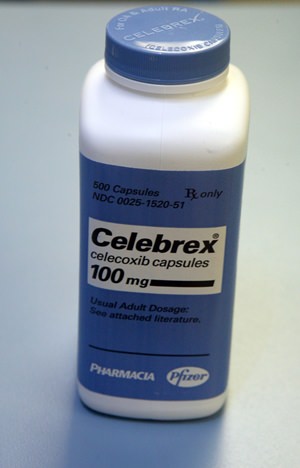New Orleans (AP) – A new study gives some reassurance to arthritis sufferers who want pain relief but are worried about side effects. It finds that Celebrex, a drug similar to ones withdrawn 12 years ago for safety reasons, is no riskier for the heart than some other prescription pain pills that are much tougher on the stomach.

“We do not want patients to suffer with pain and we need to know what is safe to give them,” said Dr. Steven Nissen, the Cleveland Clinic’s heart chief, who led the study. Fear that Celebrex would be worse than alternatives proved unfounded, and “on almost every endpoint it actually comes out the best.”
Some other doctors were less confident, partly because follow-up information was missing on one-fourth of the participants, and many others stopped taking their assigned drug. Still, several independent experts said the main results are believable.
“I find this reassuring,” said Dr. Brian Strom, a drug safety expert and chancellor at Rutgers University in Newark. No new side effects emerged and Celebrex “seemed safer that way.”
Results were discussed Sunday at an American Heart Association conference and published by the New England Journal of Medicine.
Here are some things to know about the study and options for soothing throbbing joints.
What’s the worry about pain drugs?
Many of the 52 million Americans with arthritis need long-term pain medicines and higher doses than over-the-counter ones, but some can cause serious stomach trouble. Vioxx and Bextra became blockbusters because they avoided this problem, but heart concerns emerged and the drugs were withdrawn. Some research suggested that Celebrex, the lone drug left in that class, might pose risks at high doses. So the government required its maker, Pfizer, to do this new study to keep it on the market.
The study tested daily use of Celebrex versus prescription-strength ibuprofen or naproxen in 24,000 arthritis patients with heart disease or a risk factor for it such as diabetes. The results only apply to these drugs and amounts – not to occasional use of lower, over-the-counter doses (ibuprofen is sold as Motrin, Advil and other brands; naproxen is sold as Naprosyn and Aleve), or to other painkillers such as Tylenol.
The findings are not relevant to “somebody who takes an occasional ibuprofen or naproxen for a headache,” Nissen said.
All of these drugs are available as generics, but Celebrex is not sold over the counter.
The Results
After more than two years in the study, about 2 percent of participants had suffered a heart attack, stroke, heart-related death or other heart problem regardless of what drug they were taking. This was a surprise: Earlier studies suggested naproxen would be safest.
Serious stomach problems were more common with ibuprofen and naproxen. Kidney problems were more common with ibuprofen.
The study was not designed to compare the drugs for pain relief, but naproxen showed a small advantage on one measure of that over Celebrex.
What we don’t know
The study doesn’t tell us whether any of these drugs is safer than no drug – there was no placebo group. All we can say is that if they raise heart risks, they do so equally.
No information was available on how many participants also were taking aspirin, which can interfere with ibuprofen and naproxen.
Two-thirds of participants stopped taking their assigned drug – a dropout rate typical of pain studies but still a problem for interpreting results. Discontinuation rates were similar for all three drugs, though.
Still, researchers did what they could to account for these flaws, and the results are believable, said Dr. Bruce Psaty, a drug safety expert at the University of Washington in Seattle.
Big Caveats
The study was aimed at people at high heart risk, yet only 20 percent of participants already had heart disease; the rest just had risk factors.
Also, people on ibuprofen or naproxen had more room to escalate their doses than those on Celebrex did because that drug’s label limits it to what is considered safe now.
“It’s a low risk group getting a low dose” of Celebrex, said Dr. Elliott Antman, a past president of the Heart Association and a cardiologist at Brigham and Women’s Hospital in Boston. “I remain worried about the patient with known heart disease,” and do not feel comfortable about any of these pain drugs for them, he said.
Dr. Carl “Chip” Lavie of Ochsner Medical Center in New Orleans, said the results confirm what he has been telling patients: Celebrex seems safer than many alternatives, and can be combined more safely with blood thinners and other medicines many people need.
The Impact
Any vindication of Celebrex may be coming too late to benefit Pfizer. In 2013, the drug had U.S. sales of $2.2 billion, but that fell to around $185 million in 2015, the first full year there was a generic version, which sold $636 million that year, according to QuintilesIMS, a health research company.
Last year in the U.S., about 8.3 million prescriptions were filled for Celebrex or its generic version, versus 43 million for ibuprofen and nearly 20 million for naproxen.




